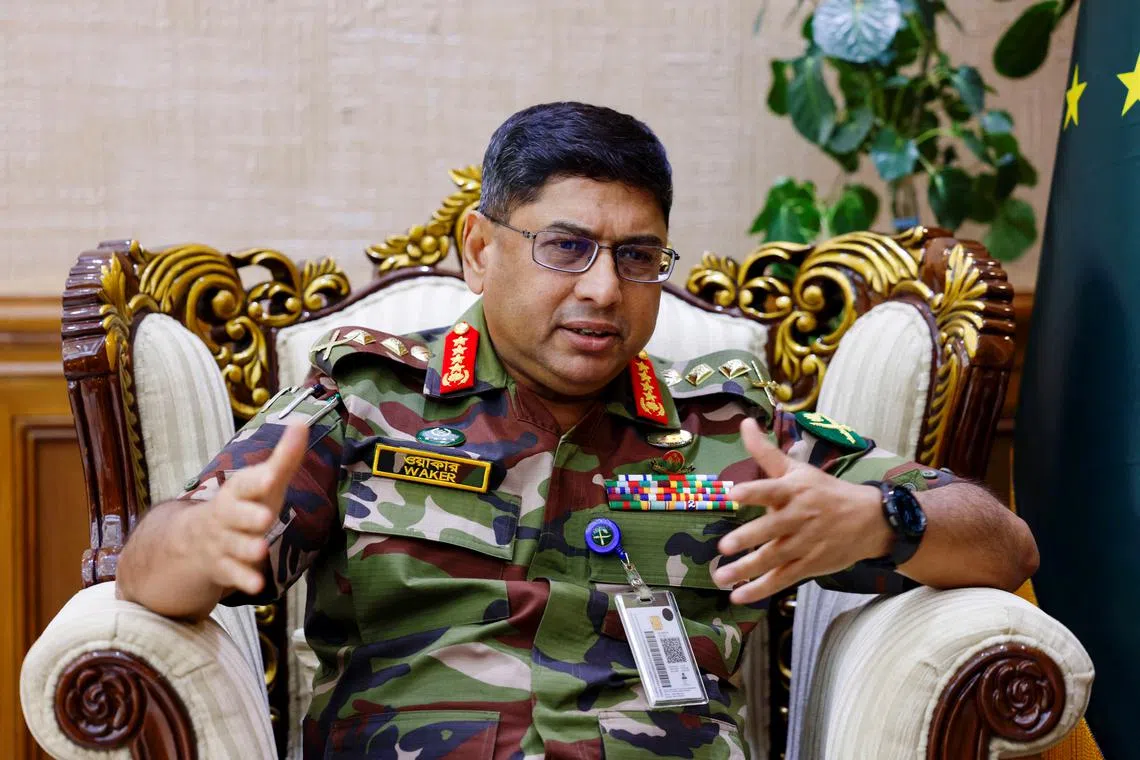Son of former Bangladesh PM Hasina wants role for her party in reforms, election
Sign up now: Get insights on Asia's fast-moving developments

General Zaman’s refusal to stand by Ms Hasina in the face of deadly student protests prompted her flight to India.
PHOTO: REUTERS
NEW DELHI - The son of Bangladesh’s ousted prime minister Sheikh Hasina said he was happy with the army chief’s timeline for elections within 18 months, though it was later than expected, but warned that genuine reform and polls were impossible without her party.
General Waker-uz-Zaman, whose refusal to stand by Ms Hasina in the face of deadly student protests prompted her flight to India in August,
“I’m happy to hear we have an expected timeline at least now,” Ms Hasina’s son and adviser, Mr Sajeeb Wazed, told Reuters late on Sept 24.
“But we have seen this play out before, where an unconstitutional, unelected government promises reform, and then things only get worse.”
He was referring to Bangladesh’s history of coups since its independence from Pakistan in 1971. The most recent was in 2007, when the military backed a caretaker government that ruled until Ms Hasina took power two years later in a tenure that ran 15 years.
With the police left in disarray after Ms Hasina fled, the powerful army took a key role in subsequent events. Gen Zaman said he meets the head of the interim government each week, as the military backs its stability efforts.
The two main political parties, Ms Hasina’s Awami League and its bitter rival, the Bangladesh Nationalist Party (BNP), have both called for elections to be held within three months of the interim government taking office in August.
The South Asian nation’s unelected interim government, led by Nobel Peace laureate Muhammad Yunus, has promised reforms in the judiciary, police and financial institutions before elections, but has not set a date for the exercise.
On Sept 25, Dr Yunus’ office said the government would hold talks with political parties after receiving recommendations from the six reform panels it has set up.
“Once a consensus on the reforms is reached and the voter list is prepared, the date for the vote will be announced,” it said in a statement.
The BNP said it would like elections held at the earliest opportunity.
Mr Wazed, who lives in Washington, said neither he nor the interim government had reached out for talks on the way ahead for the country of 170 million.
“It’s impossible to have legitimate reforms and elections by excluding the oldest and largest political party,” he added.
Ms Hasina has been sheltering near Delhi since she fled in August. Many other senior Awami League leaders have either been arrested, on accusations of having roles in the strife that killed more than 1,000 people, or gone into hiding.
Many Awami League activists have been killed since Ms Hasina’s downfall, Mr Wazed added.
Representatives of the interim government did not immediately respond to requests for comment on his statements.
The head of an election reform panel, Mr Badiul Alam Majumder, said it would make recommendations within three months following a review.
“It’s up to the government to decide whether to hold talks with the Awami League, or determine the timing of the elections,” he added.
In August, Mr Wazed told Reuters that Ms Hasina was ready to face trial at home, a demand made by students who led the uprising, and that the Awami League would like to fight the elections.
On Sept 24, asked when Ms Hasina might return home, he replied: “That will be up to her. Right now I want to keep my party’s people safe, so I want to raise international awareness on the atrocities being committed against them by this Yunus regime.” REUTERS


